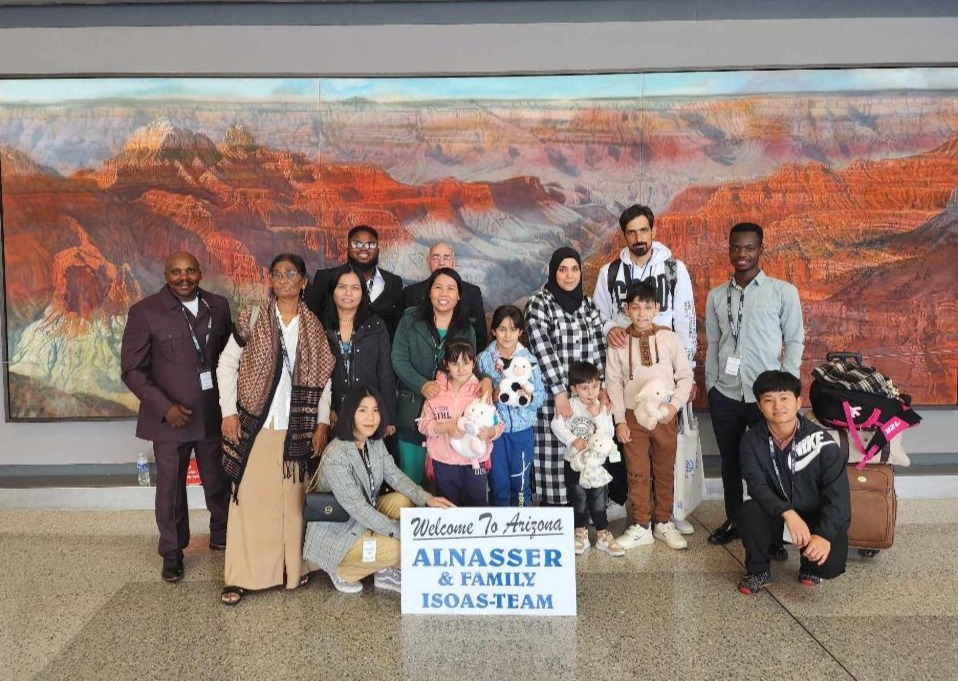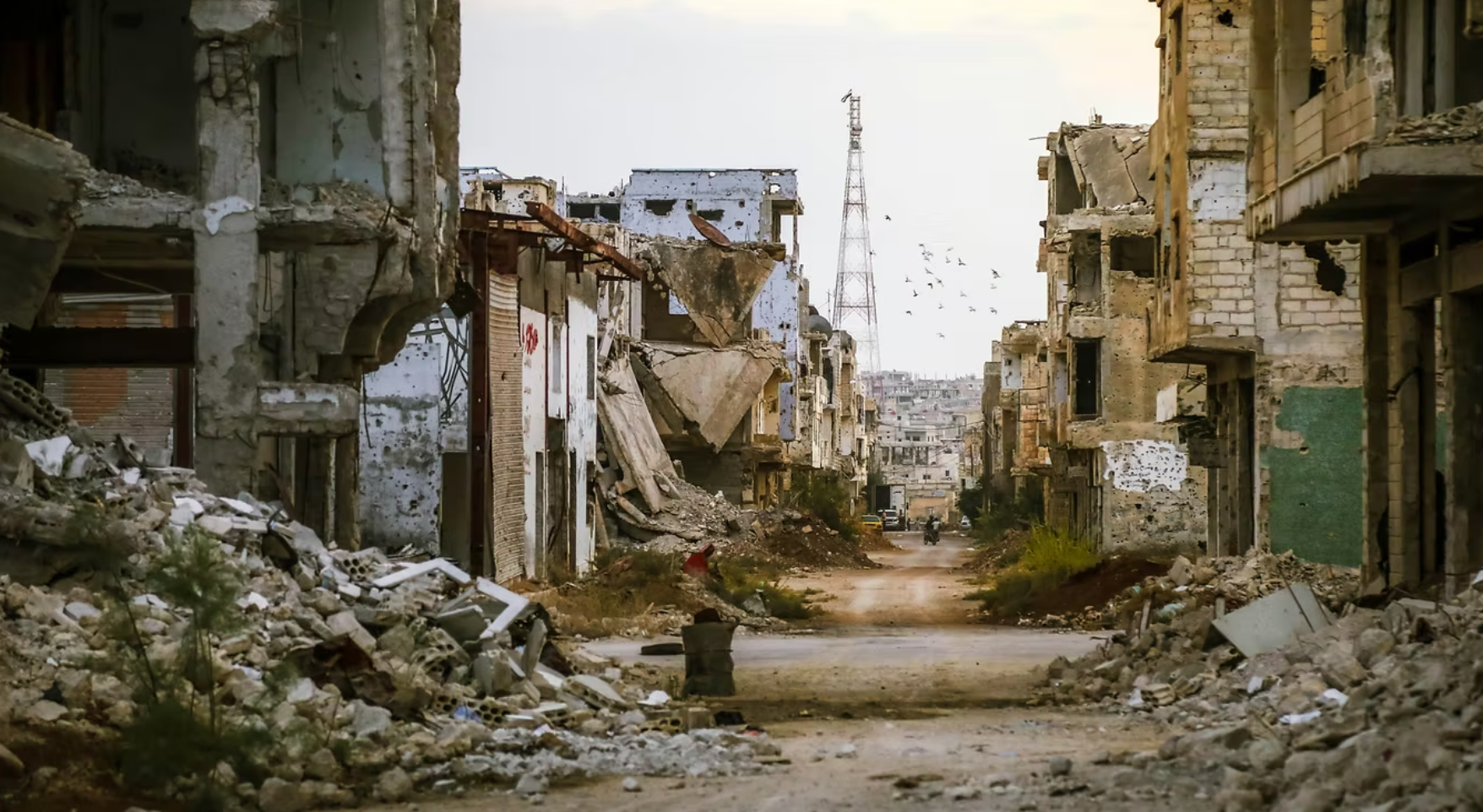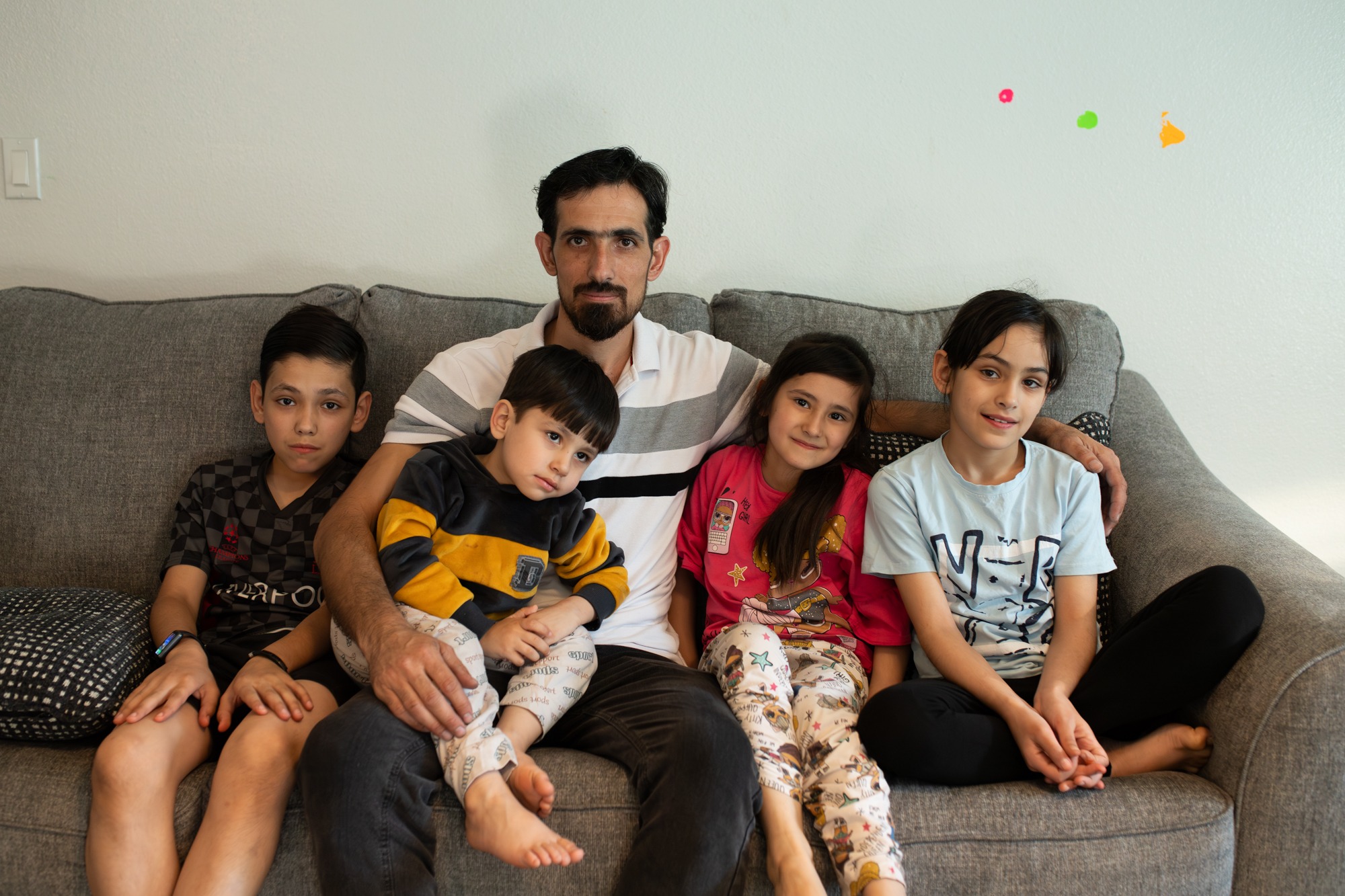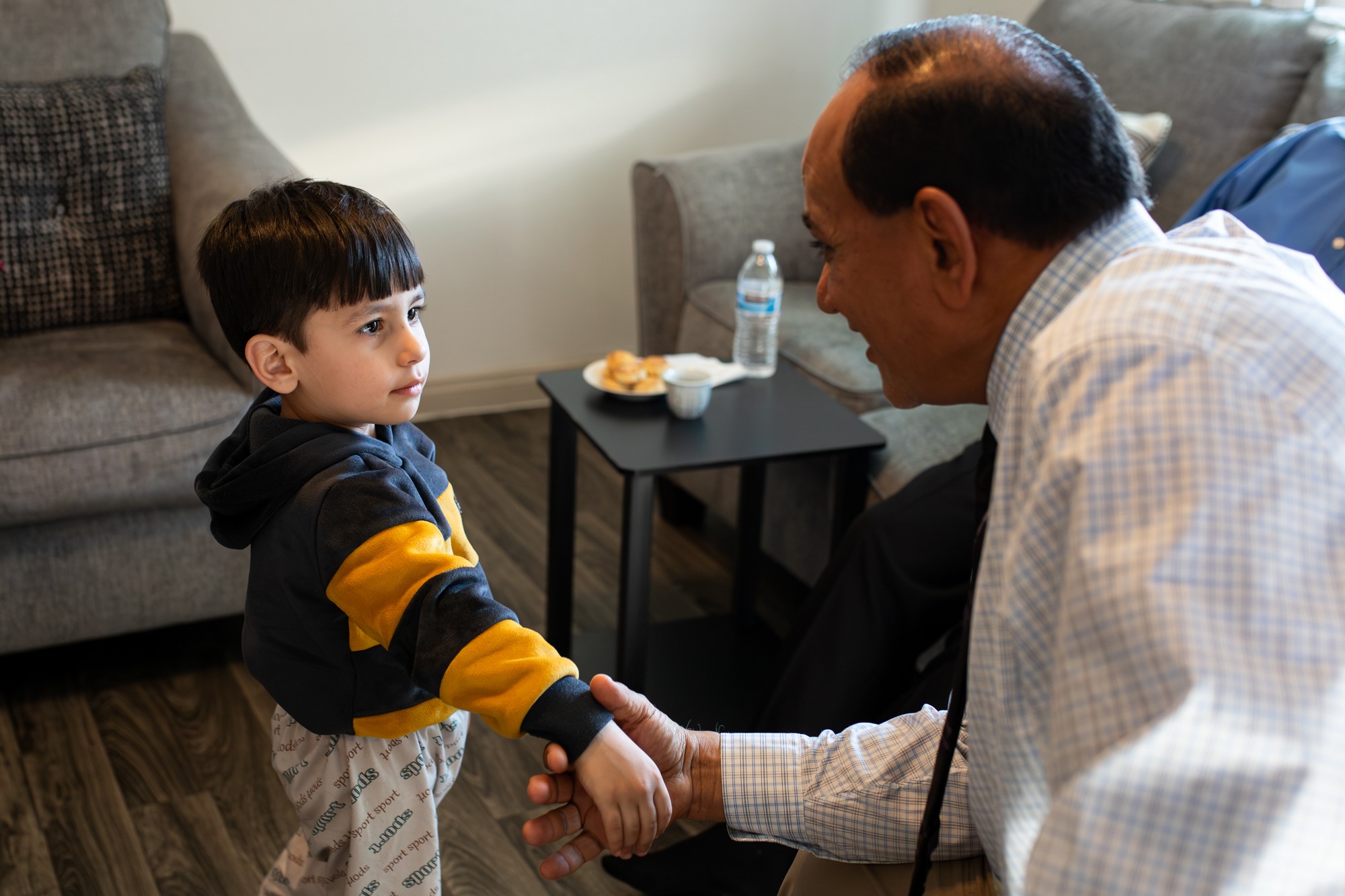‘In our community, no one is doing it like this’
By Lily Combs

For the past four decades, resettlement agencies have been the primary avenue for assisting incoming refugees in the U.S., but a new path is quickly gaining traction.
In January 2023, a private sponsorship program called Welcome Corps was launched by the U.S. Department of State. Modeled after Canada’s Private Sponsorship of Refugees program, Welcome Corps allows groups of five or more adults to resettle refugees.
Thirteen-thousand sponsor applications have been submitted since the program’s launch. In the first year alone, 15,000 people applied to sponsor over 7,000 refugees.
Among the first refugees to come to the U.S. through Welcome Corps are Ismail Alnasser, Fatin Alfandi and their four children.
Alnasser and Alfandi resettled in Arizona last December. They are originally from Syria — more specifically, they are from the province of Dara’a, where the country’s current conflict broke out.
Syria has been in civil war since 2011. The war ignited after 15 teenagers were arrested and tortured for protesting with graffiti — one of them was killed. This event erupted into more protests followed by the government-sanctioned killing of hundreds of demonstrators and the imprisonment of even more. Conflict has ensued since.
First they used to throw grenades, and then planes were dropping bombs ..."
Alnasser was attending a university in Syria when the war started. He said to go to his classes from home he had to pass 25 checkpoints where he was interrogated by police. One day, while he was walking to class with a friend, he was stopped at a checkpoint and taken to prison after they saw on his ID that he was from Dara’a.
“We were not doing anything; we were walking,” Alnasser said. A translator sat across from him and his wife, translating their Arabic into English.
Alnasser said he was put with 50 other people into a cell no bigger than his current apartment living room. He had no chance to tell his family before he was taken, and he was given no indication as to when he would leave.
“It was a hopeless situation in despair hearing the testimonies of other people being in prison for five months, for a year or so,” Alnasser said. “So, I’m thinking that could have been me. It was, needless to say, a miserable feeling.”
Twenty-five days later, Alnasser had a trial and was released from prison. Soon after, he fled to Jordan, but he returned three months later to finish college. He married his wife, Alfandi, after he went back to Syria. However, conflict persisted and left the couple with no other option but to flee again — this time for good.
“First, they used to throw grenades, and then planes were dropping bombs, so it was a matter of life or death,” Alnasser said.
After they left Syria in 2013, Alnasser and Alfandi’s two-story house was demolished by a bomb, one that destroyed the whole neighborhood.

Their journey back to Jordan took 36 hours. The couple rode in a truck used for transporting animals with 40 people piled inside of it. Smugglers drove them through the desert while avoiding checkpoints along the way.
“It was a very fearful experience because if at any checkpoint [soldiers] saw us, they would shoot at us,” Alfandi said.
The two eventually made it safely to Jordan, where they spent three days in a refugee camp until they found a place of their own. The country ended up becoming their home for the next 10 years, and their four children were born there as refugees.
“When we left Syria to Jordan, we thought we were going to stay for two, three months until the situation calmed down, but of course, the situation got for a year, two, three, up to 10 years,” Alnasser said.
In Jordan, they were safe physically, but they struggled financially. Alnasser said he would take any job he could get, from working in agriculture to painting houses. Before he was able to get a work permit, he said some people tricked him out of payment for jobs he already completed. Without a permit, he was unable to contest.

In 2020, the family was selected to resettle in Europe. However, Alfandi was pregnant at the time with their fourth child, so the resettlement was postponed. The next resettlement was not assigned until three years later, and this time it was not to Europe but to the U.S. There, the family would be welcomed by one of Arizona’s first private sponsor groups.
Alnasser’s family was assigned to a sponsor group under the name International School of Applied Sciences (ISOAS). The group was initiated by former refugee and business owner Phyu Win.
Win’s group is a part of 197 Arizona Welcome Corps applications as of April 1. As a former refugee who came to the U.S. in 2005, when Win saw the news of the program’s launch last year, she knew she had a role to play in it.
“I know what is difficult for all the refugees, new people, coming here,” Win said. “You know, I've been through this kind of stuff, everything.”
Win is from Myanmar, formerly known as Burma — a country that has been plagued by conflict since 1948. Over 2.7 million people are currently displaced within the Southeast Asian country and more than one million have fled its borders for safety.
“To me, in my life, I like to help the refugee people,” Win said. “That is my main important thing, I really want to help.”
Win’s vision with Welcome Corps is to help others from her country. However, because the group initially sponsored when the program was still new, they could not yet select the refugee’s country of origin, so they decided to proceed with a family selected for them. That family was Alnasser, Alfandi and their four young children.
Win’s group welcomed Alnasser’s family in December of last year. The group of nine greeted them at the airport with a big welcome sign and excitement to meet their family.
Private sponsor groups function similarly to resettlement agencies in that they must provide core resettlement services for 90 days after arrival.
ISOAS met with Alnasser’s family almost every day in the beginning to help them with any needs and to acquaint them with the U.S. Within the 90-day resettlement period, the family had already reached the self-sufficiency goal.
However, while the Welcome Corps commitment is 90 days, the sponsor group made their own one-year commitment to the family to continue support.
“We did advise them, you know, the 90 days were coming up,” explained Robert Geirsberg, a member of the sponsor group. “We wanted to make sure they're doing things on their own and that we're thinking about another group, and the first thing out of their mouth was, ‘Don't forget us.’”
Giersberg said he meets with the family almost every other day. As a driving instructor, he is teaching Alfandi how to drive and is training Alnasser to become an instructor.
Alnasser currently has a job putting up awnings, but he said he wants to find another field of work where he can better support his family.
“I dream that I would have my own private work,” Alnasser said. “That I can support my family, something that makes a steady income. Hopefully, in the future, we will be able to buy our own home.”
Alnasser is interested in becoming a barber. However, he is unable to cover school fees and does not have a way to compensate for the working hours he would miss while in school. The sponsor group is working on getting a scholarship for barber school, but in the meantime, Geirsberg is training Alnasser to be an instructional driver so he can have a steady job sooner.

Alnasser has been in Arizona for over five months, and he said life in the U.S. is much better than in Jordan. He said that here his kids have access to college, he can get health insurance and he gets paid for the labor he does. He also hopes to get his citizenship when the time comes.
“In Jordan, we were very much limited,” Alnasser said. “If I left the country, I could not go back, but now as I come here and hopefully get my permanent residency and then citizenship, I can travel anywhere.”
The sponsor group has submitted two more applications since welcoming Alnasser and Alfandi. One application is for refugees Win knows from Myanmar, and the other is for another family selected for them.
There is no end in sight for ISOAS’ work in welcoming and assisting newcomers.
“I want to show myself and all my community also, they can do it,” Win said. “In our community, no one is doing it like this.”
Post a comment